Since its relocation to the new campus on Hengqin Island in 2014, UM has significantly expanded its research facilities. This transformation has empowered UM scholars to transcend disciplinary boundaries and launch pioneering interdisciplinary projects. Over the past decade, UM has made significant contributions to academia, industry, and the broader community, amplifying the quality and impact of the university’s research.
Establishing a strategic research layout
At the core of every university’s mission is the pursuit of knowledge. Before relocating to Hengqin, UM encountered significant space limitations. Some research institutes were confined to small rooms, which hindered their development. The move to the new campus has supercharged the university’s research capabilities, enabling it to accelerate ongoing projects and explore new avenues for academic enrichment. Over the past decade, the university has significantly expanded its research infrastructure, with research spaces on the campus now exceeding 170,000 square metres, dedicated to research in microelectronics, Internet of Things for smart cities, Chinese medicine, health sciences, applied physics and advanced materials, energy, environmental protection, and data science.
UM has implemented its ‘3+3+3+3’ strategic research layout in recent years. This plan provides comprehensive support for the three state key laboratories (State Key Laboratory of Quality Research in Chinese Medicine, State Key Laboratory of Analog and Mixed-Signal VLSI, and State Key Laboratory of Internet of Things for Smart City), three emerging research fields (precision medicine, advanced materials, and regional oceanology), three interdisciplinary research fields (artificial intelligence and robotics, data science, cognitive and brain sciences), and three research platforms for the humanities and social sciences (Institute of Advanced Studies in Humanities and Social Sciences, Centre for Macau Studies, and Asia-Pacific Academy of Economics and Management). As of March 2024, UM was among the top 1 per cent in the Essential Science Indicators (ESI) database in 12 subjects, which indicates a remarkable advancement as the university was represented in only five subjects in 2018.
Expanding national and regional research platforms
Since 2010, UM has been putting effort into developing its national and regional research platforms. One notable example is the State Key Laboratory of Quality Research in Chinese Medicine, which UM obtained approval to establish in 2010. In 2020, the laboratory partnered with a leading company specialising in Chinese medicine and listed on the Fortune Global 500 to establish the Macao Centre for Research and Development in Chinese Medicine. In 2021, the laboratory was awarded the Medal of Merit–Professions by the Macao SAR Government in recognition of its research achievements. Building on the laboratory’s pioneering work, the Macao Centre for Testing of Chinese Medicine at UM began trial operations in March 2024.
UM also obtained approval to establish the State Key Laboratory of Analog and Mixed-Signal VLSI in 2010. In 2018, UM set up the Institute of Microelectronics to enhance its efforts in talent cultivation, research, and practical applications in microelectronics and related interdisciplinary fields. At the 70th International Solid-State Circuits Conference (ISSCC) in 2023, scholars from the laboratory presented 15 papers, which demonstrated the university’s leading global position in the field. Additionally, the laboratory has set up joint laboratories with enterprises in the Guangdong-Hong Kong-Macao Greater Bay Area and across the country.
In 2018, UM established the State Key Laboratory of Internet of Things for Smart City, which has since garnered a number of prestigious awards such as the State Scientific and Technological Progress Award. The laboratory is at the forefront of the national ‘dual carbon’ strategy and the development of a salubrious and resilient smart city. Scholars working in the laboratory have conducted fundamental and applied research through interdisciplinary collaboration. Its key projects include Macao’s first platform for autonomous driving vehicles featuring collaborative intelligence, the development of various sensor technologies for intelligent transport systems, and Macao’s first smart city virtual reality simulation and decision-making platform.
The Faculty of Health Sciences was the first faculty to relocate to UM’s new Hengqin campus. Since the relocation, UM has made significant achievements in precision medicine research. Prof Chuxia Deng, dean of the Faculty of Health Sciences, says, ‘The new campus provides state-of-the-art facilities for biological sciences and medical research, which have enhanced our investigations into drug development, disease mechanisms, and in particular, cancer research. This has resulted in numerous internationally recognised research achievements.’ He adds that the faculty’s fruitful results in precision oncology research led to the Ministry of Education’s (MoE) approval for the establishment of the MoE Frontiers Science Center for Precision Oncology in late 2020. This centre is the first and so far the only Frontiers Science Center established by the central government in Hong Kong and Macao.
Moreover, UM has established five joint laboratories with the Chinese Academy of Sciences. Between 2019 and 2023, the university obtained approval to set up 12 Guangdong-Hong Kong-Macao joint laboratories. It has also set up over 20 joint laboratories in collaboration with enterprises, organisations, and other higher education institutions, which have expanded the scale and impact of UM’s research.
Advancing innovative research
Following its campus relocation, UM has enhanced its research infrastructure by establishing several new institutes. These entities are dedicated to advancing research in emerging fields, interdisciplinary areas, and disciplines within the humanities and social sciences. In 2017, UM established the Institute of Collaborative Innovation to integrate the humanities and social sciences with advanced technology. A strategic reorganisation in 2019 broadened the institute’s scope to include the Centre for Cognitive and Brain Sciences, the Centre for Artificial Intelligence and Robotics, the Centre for Data Science, and the Centre for Innovation and Entrepreneurship. The year 2019 also saw the establishment of the Institute of Advanced Studies in Humanities and Social Sciences. This institute has launched several schemes, including the Fellowship Scheme and the Excellence Publication Scheme, with the aim of fostering the development of world-class, interdisciplinary research teams in the humanities and social sciences. In addition, UM obtained approval to establish the Macao Centre for Research and Development in Advanced Materials in 2022. The centre focuses on research on new energy materials, eco-friendly materials, and materials for health protection, thereby driving forward the advanced materials industry.
Over the past decade, various UM faculties have established research centres, such as the Centre for Studies of Translation, Interpreting and Cognition, the Centre for Constitutional Law and Basic Law Studies, the Centre for Regional Oceans, the Centre for Applied Mathematics, and the Centre for Linguistics. The establishment of these research centres has reflected the university’s growing commitment to expanding and diversifying its academic pursuits.
Fortifying industry-academia collaboration to transform research outcomes
UM has developed a ‘5-in-1’ system for research innovation and result transfer. This system focuses on the establishment and improvement of industry-academia platforms to support the commercialisation of research results in five dimensions: innovation, service, management, cultivation, and practice. This approach further enhances the synergy between academia and industry.
The Zhuhai UM Science & Technology Research Institute (ZUMRI), located in the Hengqin-Macao Youth Entrepreneurship Valley, is UM’s first demonstration base for industry-academia collaboration. ZUMRI comprises six R&D centres and the Hengqin branches of the three state key laboratories at UM. As of April 2024, ZUMRI had undertaken 160 research projects approved by national, provincial, and municipal science and technology departments. It has also conducted 127 research projects commissioned by various enterprises. Many industry-academia research projects conducted by ZUMRI, including robotic chips, traditional Chinese medicine prescriptions, stem cell and regenerative medicine projects, advanced fibre-optic sensing and acquisition equipment, and nano-foam concrete, have successfully transitioned from development phase to production, and some have even been launched in the market. Building on these achievements, UM is set to further enhance its industry-academia collaboration by establishing the Hengqin University of Macau Advanced Research Institute.
Prof Chen Guokai, interim director of ZUMRI, emphasises that ZUMRI, which was established in 2019, is pivotal for enhancing industry-academia collaboration at UM. He says, ‘The institute serves as a nexus for collaboration between UM and businesses in the Guangdong-Hong Kong-Macao Greater Bay Area and beyond, facilitating a range of activities spanning from translational research, validation, pilot phase, to commercialisation services.’ Prof Chen also mentions that ZUMRI provides UM researchers with direct access to a wide array of research resources from mainland China. For example, researchers are able to analyse cancer cells with samples from various regions in the mainland without the need for cross-border delivery to Macao.
Established in 2017, CIE serves as a national co-working space. The centre supports faculty, students, and alumni in transforming their creative ideas into tangible solutions and ventures through its robust industry-academia collaboration platforms. To date, the centre has incubated over 50 companies, with projects spanning cultural creativity, environmental protection, new materials, information technology, and the medical and biotechnology sectors.
In 2019, UM restructured its commercial subsidiary UMTec Limited to improve its services for industry-academia collaboration. The company manages and industrialises the university’s intellectual properties, while also supporting the protection and commercialisation of innovation achievements. In addition, in 2020, UM launched UMCERT Engineering Research and Testing Limited to meet the demand for engineering quality control and technical support in Macao.
Recruiting outstanding researchers
Alongside refining its research layout, UM has revamped its talent acquisition strategy. The UM Macao Talent Program (initially known as UM Talent Programme) was launched in the 2017/2018 academic year to recruit eminent researchers. A key component of this programme is the UM Macao Fellow Scheme, which is designed to nurture promising local scholars. Additionally, UM’s global recruitment efforts have borne fruit, with over 80 distinguished scholars joining the university in 2023, each bringing international teaching and research expertise.
Prof Shen Hanming, associate dean of the Faculty of Health Sciences, took up the position as chair professor at UM in 2020 after teaching at the National University of Singapore for over two decades. He is an expert in cancer cell biology, with a particular focus on autophagy. ‘I joined UM because I saw huge potential for growth in the Greater Bay Area, the excellent academic environment of UM and the Faculty of Health Sciences, as well as the beautiful campus,’ he says. After joining UM, he assembled a team of postdoctoral researchers and doctoral students, which has achieved notable advancements in research on autophagy/mitophagy and targeted therapy against non-small cell lung cancer.
Prof Yu Xingzhong, director of the Institute of Advanced Studies in Humanities and Social Sciences and chair professor in the Faculty of Law, joined UM in 2022 after teaching at Cornell University for about ten years. His research interests span social theory, comparative legal philosophy, and intelligent technology and law. ‘Before joining UM, I visited the campus twice for seminars, and I was impressed by the university’s commitment to interdisciplinary research,’ he says. ‘I am now working with my colleagues to promote research in the humanities and social sciences at the university, and to foster interdisciplinary integration between these disciplines and technology.’ Since joining UM, Prof Yu has published books on the rule of law and civil orders, and digital literacy. He has also begun research on the philosophy of the heart.
Achieving fruitful research results
Over the past ten years, UM has achieved remarkable research results in various fields. Its scientific and technological achievements include breakthroughs in breast cancer treatments, advancements in autonomous driving technology, and new discoveries in the immunomodulatory properties of Chinese medicine. The university has also excelled in the humanities and social sciences, publishing several academic journals, including South China Quarterly, Journal of Macau Studies, and Macau Law Review. Furthermore, it has enriched academic discourse with publications on a diverse range of topics, including the Constitution of the People’s Republic of China and Portuguese language pedagogy. These achievements have been widely recognised by academia and the broader community.
The number of journal publications by UM scholars increased significantly in the past decade, from 780 in 2014 to over 2,400 in 2023. The number of citations of these works also surged from about 5,500 in 2014 to nearly 90,000 in 2023. Furthermore, the cumulative number of patents granted to UM rose significantly, from 28 in 2014 to 236 in November 2023. Some of the university’s research results have even been recognised with prestigious awards, including the State Scientific and Technological Progress Award, the Macao Science and Technology Award, the Guanghua Engineering Science and Technology Prize, and the Xplorer Prize.
Contributing to society
Over the past decade, UM researchers have explored the unknown, and the university has achieved what once seemed unattainable. On the new Hengqin campus, the university has effectively leveraged its resources to expand the scope of its fundamental and applied research, transcending disciplinary and geographical boundaries. This expansion has resulted in the establishment of larger platforms that foster research innovation and collaboration. Looking ahead, the university remains resolute in its unwavering commitment to pioneering interdisciplinary and innovative research, transforming research results into tangible outcomes, and delivering cutting-edge insights that benefit academia and society at large.
Chinese & English Text / Davis Ip, Senior UM Reporters Zhang Fangbo & Ku Weng Hin
Photo / Editorial Board
Source: UMagazine Issue 29
All articles in the special issue dedicated to the 10th anniversary of UM’s relocation to Hengqin Island:
- Rector’s words
- Key milestones of the past decade
- Nurturing innovative talent to embrace new horizons
- Breaking barriers through interdisciplinary research
- Optimising platforms to serve society
- Strengthening global networks
- Building an all-encompassing educational environment
- Seizing new opportunities from Macao-Hengqin integration

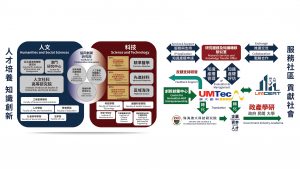
The UM System of Research and Knowledge Translation
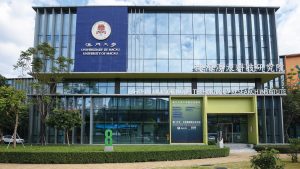
UM established the Zhuhai UM Science & Technology Research Institute, its first industry-academia collaboration demonstration base.
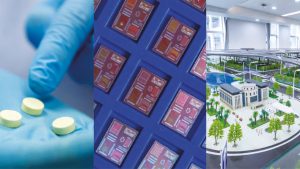
Since the campus relocation, UM has accelerated its research development and expanded into new academic disciplines.
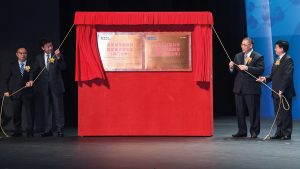
UM is committed to developing national and regional research platforms

UM is committed to promoting industry-academia collaboration, exemplified by the development of its autonomous bus.
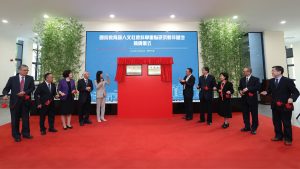
UM is committed to advancing research in the humanities and social sciences, as well as enhancing cooperation with mainland universities.
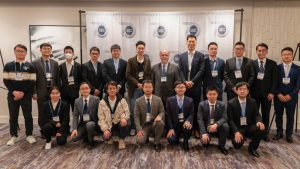
UM researchers participated in the 70th International Solid-State Circuits Conference, where they presented their papers and research results, showcasing the university’s leading p

The humanities and social sciences journals published by UM
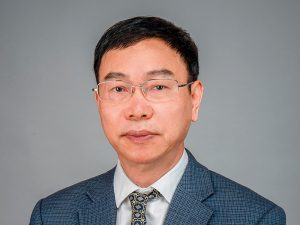
Prof Chuxia Deng

Prof Chen Guokai
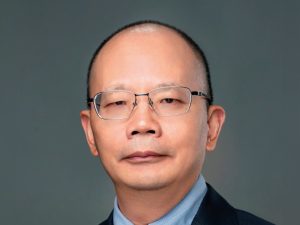
Prof Shen Hanming
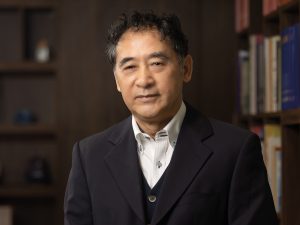
Prof Yu Xingzhong
